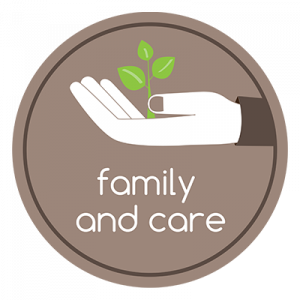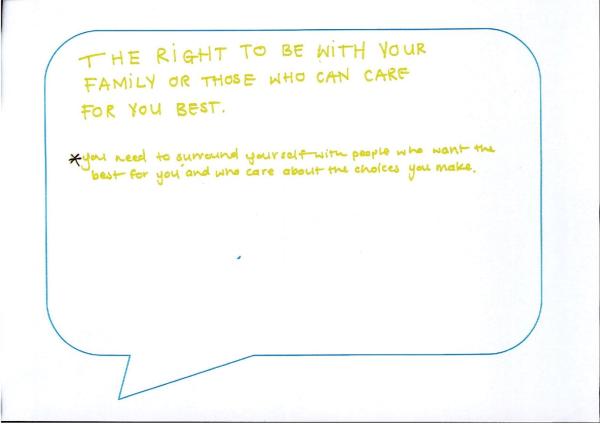You are here:
Family and Care
What does this mean?

It’s your right to be cared for by your family. If it isn’t safe for you to be with your family, you should stay with a family that can care for you.
In most court cases about family life, a judge must listen to what you think and take it into consideration when they are making a decision that affects you.
Your family should teach you about children’s rights. The Government should help your family do this.
EXAMPLE: It’s your right to leave your family home at 16, if your parents allow it. When you are 18, you don’t need your parent’s permission.

Learn more about this right
Do I have this right in Ireland?
- UNCRC, article 9– it’s your right to live with your parent(s), unless it is bad for you. You have the right to live with a family who cares for you.
- UNCRC, article 10 – it’s your right to be together with your parents if you live in a different country than your parents.
- UNCRC, article 18 – it’s your right to be raised by your parents if possible.
- UNCRC, article 20 – it’s your right to special care and help if you can’t live with your parents.
- UNCRC, article 21 – it’s your right to care and protection if you were adopted or in foster care.
- UNCRC, article 25 – if you live in care or in other situations away from home, it’s your right to have these living arrangements looked at regularly to see if they are the most appropriate.
- Under Article 41 of the Irish Constitution, it’s your right that you are cared for and brought up by your family.
- Under the Child Care Act 1991, it’s your right to be cared for by your family. However if it isn’t safe for you to be with your family, it’s your right to be cared for by the State.
- Under an amendment to the Child Care Act 1991, it’s your right to receive an aftercare plan for when you leave state care when you are 18.
- Under the Children and Family Relationship Act 2015, it’s your right that your best interests are thought about if you are adopted.
- Under the Adoption Act (Amended) 2017, it’s your right to be adopted by your foster care family if you have been in their care for 18 months.
Doing a project?
- There are many different types of family in Ireland. In May 2015, the people of Ireland voted to allow people of the same sex to marry.
- When a family can no longer care for their child, or if a court decides that it is in a child’s best interests to not live with their family, a child may live in the care of the State, like in foster care or in residential care.
- In February 2018, there were 6,161 children and young people living in the care of the state in Ireland.
- In 2016, the Adoption Authority of Ireland granted 95 adoptions. The majority of these adoptions (65) were stepfamily adoptions.
- Sometimes children look after their younger siblings or even their parents. They are called young carers.
- Young people leaving State care at the age of 18 can be at risk of becoming homeless. They now have the right to an after-care plan and help until they are 21 years old or finished their education.
- In 2016, the UN Committee on the Rights of the Child recommended that Ireland needs to do more to prepare and support young people for leaving care and to assist them when they have left care.
Links to other organisations
- EPIC – Find out how EPIC works with and for young people in care in Ireland
- Pathways– ‘Pathways’ is an aftercare guide for young people who are preparing to leave care, by young people who have left care
- Barnardos – Information for young people whose parents are separating or divorced.
- You Are Not Alone – This is a short film by the OCO and the Courts Service that gives young people information about some of the routes parents may take when they separate. (e.g. family mediation or going to court).
- Adoption Authority Ireland – This organisation has information and videos for young people about adoption in Ireland.


